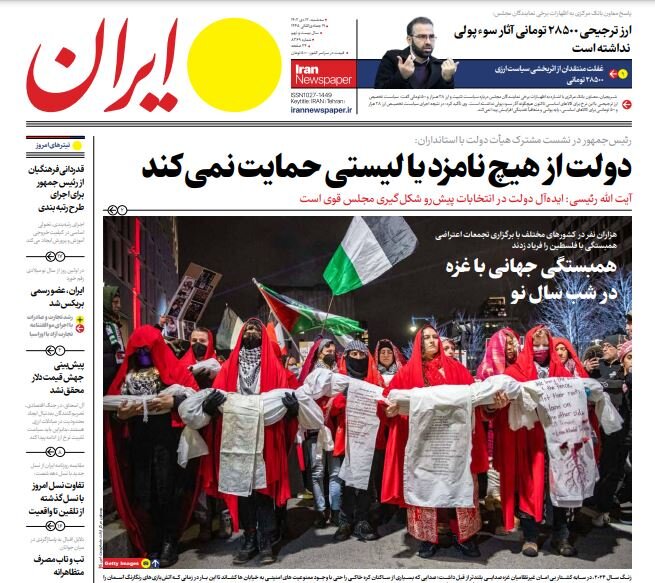Strategic patience does not mean passivity

TEHRAN - In a note, the Iran newspaper addressed Iran's mutual reaction to Israel's crimes and quoted Dr. Bijan Pirouz, Professor of International Relations at Tehran University, as saying: "It must be said that ‘reciprocity’ is not a complicated task that anyone considers Iran incapable of doing.
The basic strategy of the Islamic Republic of Iran in dealing with crimes is ‘strategic patience’ and ‘pursuing and punishing criminals’ instead of reciprocating. In a situation where a range of opinions are based on maintaining and strengthening the system's deterrence through direct action to take revenge for Israel's ungenerous assassinations; the evaluation of some others is based on the belief that the Zionist regime seeks to get Iran directly involved in the Gaza war and the formation of a full-scale regional war. So, accordingly, Iran should not play into the Zionists' hand. The fact is that, contrary to the media propaganda, none of the officials of the Zionist regime have dared to accept responsibility for the air attack on Damascus on (December) Dey 4, 1402. But even in the case of official acceptance of responsibility for this crime, it should be noted that basically ‘reciprocity’ instead of ‘pursuing and punishing criminals’ will never be among the choices of the Islamic Republic of Iran as a strategy.
Hamshahri: Iran among emerging powers
In an analysis, Hamshahri discussed Iran's regional diplomacy and joining BRICS. The paper said: Iran's official membership in the BRICS group along with 4 countries Saudi Arabia, UAE, Ethiopia, and Egypt has started to open new doors for Iran's regional and international role-playing. Upon the Islamic Republic joining the world's group of emerging economies, a new chapter in Tehran's regional and international cooperation will take place, with the approach of a more active presence in the global economy. This membership is while during the last year, Tehran has taken significant steps to play a balanced role at the regional and international levels, and by following the strategy of soft balance in international interactions, it has succeeded in creating an effective deterrence against the Western hegemonic trends and approaches. Considering that BRICS has chosen global multilateralism approaches as its strategic priority, Iran's joining BRICS has brought vast political-economic opportunities and advantages to Tehran. Moving towards "de-dollarization" and "justly and multilateralist order" is considered one of the most important strategies.
Siasat-e-Rooz: Iran does not respond to Russia's positions on regional issues
In a commentary, Siasat-e-Rooz discussed Iran's reaction to Russia's recent positions and wrote: According to Nasser Kanaani, the spokesman of the Ministry of Foreign Affairs, Iran is not responsible for Russia's positions on regional issues. It is obvious that the relations between Iran and Russia are constructive and moving forward and based on the interests of the two countries. Even in the course of developing Iran's relations with neighboring countries and within the framework of the neighborhood policy and improving the status of cooperation with important and effective countries in the region, we were witnessing an increase in the relations between the two countries in different fields. However, the existence of diverse relations in different fields does not necessarily mean the consensus of the two countries in all regional and international fields. The three islands will always be for Iran, and Iran has declared its clear official position in this regard, and in the conversation with Russian officials, including the foreign minister of this country, the clear view of the Islamic Republic of Iran was also raised. Iran has stated its principled positions on issues related to sovereignty and territorial integrity, and it is not kidding about it.
Sobh-e-No: Modern cooperation with traditional friends
In an article, Sobh-e-No discussed the benefits of Iran's membership in the BRICS group. It wrote: The news of the implementation of Iran's membership in BRICS can have many advantages for Iran in terms of politics and economy. After the Islamic Republic of Iran became a member of the Shanghai Organization, now joining BRICS is another turning point in Iran's economic and diplomatic record. These memberships show that Iran's traditional cooperation with China and Russia has reached a more modern era and these cases of cooperation have benefits for Iran, which now reaches the executive stage with Iran's official membership in BRICS, and will have an important effect in neutralizing sanctions. One of the agendas of the BRICS group can be seen as confrontation with the Western economic system, which covers the entire world relations. Now, Iran stands in the form of a modern coalition of the countries of the world against Western and American monopolization and has become a member of the BRICS group in the global transit competition. Of course, this point is significant that the internal infrastructure must also be optimized to keep up with the external conditions.
